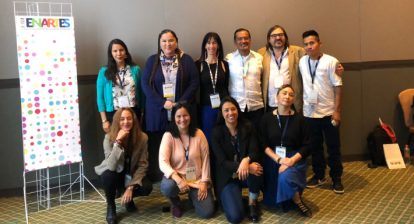April 25, 2018 – Today, the Honourable Mélanie Joly, Minister of Canadian Heritage, and Simon Brault, Director and CEO of the Canada Council for the Arts, announce important measures to promote a healthy, respectful and harassment-free work environment in recipient organizations.
The Department of Canadian Heritage and the Canada Council for the Arts will award close to $552,000 to the Cultural Human Resources Council (CHRC), which supports workers and employers to build better workplace environments within the cultural sector. The Department of Canadian Heritage is providing $252,000, and the Canada Council for the Arts will be contributing $300,000 to the organization. The funding will be used to support a series of initiatives to equip the cultural sector with the tools, practices and training for building and maintaining respectful workplaces under the title “Respectful Workplaces in the Arts”. These new tools and resources will be made available to over 1,750 art organizations across Canada.
On January 5, the Canada Council for the Arts committed to reviewing its operational policies to ensure it could fairly and effectively address situations involving artists or organizations receiving Canada Council funding. That work is complete. Now, when accepting grants, recipients must commit to fostering a workplace free from discrimination, harassment and sexual misconduct. Failure to respect this commitment could result in the Council initiating a process to review and potentially reverse a grant decision where there are serious concerns about the recipient, the funded activities, or the soundness of the Council’s investment of public funds.
“Our focus is now on supporting the arts sector as a whole in building capacity to deal with issues of discrimination, harassment and sexual misconduct and provide respectful workplaces. We want all arts organizations to have this capacity, starting with us, and we are currently reviewing our own human resources policies to ensure that they are exemplary.”
Simon Brault, Director and CEO of the Canada Council for the Arts
In addition to the financial support to the CHRC, Canadian Heritage has made important changes to promote workplace integrity in recipient organizations. Funding instruments have been reviewed to ensure that recipients commit to providing safe and respectful workplaces free from any form of harassment, abuse and discrimination. Specifically, changes will be made to the funding agreements, the application forms, the approval letter and the application guidelines to remind recipients of their commitment to workplace integrity.
Internally, the Government of Canada, both as an employer and as a regulator, is reviewing and updating its approach to dealing with prevention of sexual violence and sexual harassment in the workplace under the Canada Labour Code (Bill C-65), and is committed to providing a healthy workplace that supports the productivity, dignity, and self-esteem of every employee.
“Our industry leaders and organizations took swift action to discuss how all cultural sectors can work together to provide harassment-free, respectful work environments. I am proud to support this initiative, which will benefit over 1,750 art organizations across Canada. This joint announcement demonstrates that, together, we can accomplish a lot to prevent harassment, abuse and discrimination of any kind in the cultural sector. Integrating these changes is definitely a step in the right direction.”
The Honourable Mélanie Joly, Minister of Canadian Heritage
Susan Annis, Executive Director of CHRC, sees the commitment of both government and artists/ arts organizations reflected in actions already underway across the country, as strong and definitive statements that harassment has no place in Canada’s cultural offerings.
“Respectful Workplaces in the Arts will ensure that artists and arts organizations across Canada have the tools, resources and training to prevent harassment of any kind, and build respectful workplaces as the norm in the cultural sector.”
Susan Annis, Executive Director, Cultural Human Resources Council



